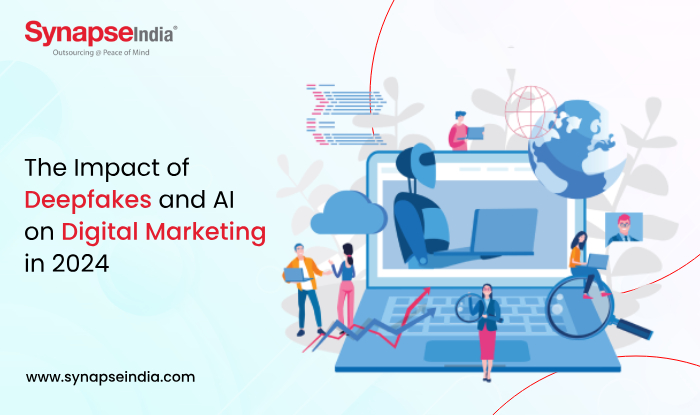 27 May 2024
27 May 2024“Deepfakes create hyper-realistic content for better storytelling and brand engagement, while AI-driven tools offer precise targeting and personalized marketing strategies through deeper customer insights.”

The rise of deepfakes and developments in artificial intelligence (AI) are set to bring in a new era of innovation and change in the quickly changing field of digital marketing. By 2024, deepfakes and AI technologies will have completely changed how brands interact with their consumers, create engaging content, and run successful advertising campaigns. This blog delves into the significant influence of artificial intelligence (AI) and deepfakes on digital marketing tactics, exposing the potential benefits, obstacles, and ramifications for marketers maneuvering through this ever-changing terrain.

With the onset of a new era in the rapidly developing field of technology, which we call the AI Revolution. Artificial intelligence is affecting every part of our lives as it develops at an unprecedented rate. It is changing corporations, industries, and how we connect with the outside world. As we set off on this thrilling adventure into the future we can feel the consequences, prospects, and problems of AI's enormous impact on society. The new era of AI has the revolutionary potential of AI and has already influenced the future of our planet.
Artificial intelligence (AI) is being incorporated into digital marketing strategies more and more, and this is a game-changing development. The following are some significant ways that AI is changing digital marketing:
Large volumes of data may be processed in real-time by AI-powered analytics systems, giving advertisers insightful knowledge about the trends, preferences, and behavior of their target audience.
Marketers can now scale up the delivery of individualized experiences and content to specific consumers thanks to AI. This degree of customization increases conversions, strengthens brand loyalty, and improves consumer engagement.
The processes of creating and optimizing content are being revolutionized by AI-powered solutions like content optimization platforms and natural language generation (NLG).
Platforms for marketing automation powered by AI reduce monotonous work and workflows, freeing up marketers to concentrate on high-value jobs. Marketers may increase time savings, lower human error, and boost the efficacy and efficiency of their campaigns by using AI for automation.
Predictive analytics solutions driven by artificial intelligence (AI) employ machine learning algorithms to project future results and trends from past data and patterns. Marketers may more efficiently allocate resources, optimize return on investment, and maintain a competitive edge with the help of predictive analytics.
By giving marketers access to cutting-edge tools and capabilities for data analysis, content personalization, task automation, and campaign optimization, artificial intelligence (AI) is radically changing the landscape of digital marketing.

The introduction of deepfake technology and advancements in artificial intelligence (AI) in 2024 are causing a major upheaval in the digital marketing industry. The way companies interact with consumers is being revolutionized by these state-of-the-art technologies, which present both opportunities and difficulties for the digital marketing industry.
With the aid of AI algorithms, deepfake technology enables marketers to produce incredibly realistic and compelling audio and video content for use in storytelling, advertising, and brand promotion. Deepfake technology allows marketers to produce immersive and captivating videos that effectively superimpose faces or voices onto pre-existing material, thereby connecting with viewers on a deeper level. To improve brand recognition, a clothing company might, for instance, utilize deepfake technology to produce customized video advertisements with influencers or celebrities wearing their products.
Furthermore, by allowing marketers to create virtual influencers with unique personalities and looks, deepfake technology can completely transform influencer marketing. By interacting with audiences in real-time on social media platforms, these AI-powered virtual influencers may promote goods and services more genuinely and interestingly. A beauty firm might, for example, establish a virtual influencer with knowledge of skincare and makeup who would offer followers individualized product suggestions and beauty advice.
Digital marketing in 2024 will also be revolutionized by AI-powered analytics and personalization capabilities, in addition to deepfake technology. Massive data sets may be analyzed by AI algorithms, which can then be used to spot trends, forecast customer behavior, and instantly improve marketing strategies. Recommendation engines with AI capabilities, for instance, can assess user preferences and browsing history to provide tailored product recommendations that increase customer satisfaction and conversion rates.
Furthermore, AI-powered chatbots and virtual assistants are transforming customer support and service by answering questions instantly and assisting customers with their purchases. These AI-powered chatbots can comprehend natural language and context, giving users tailored advice and support according to their unique requirements and preferences.
In general, the way firms communicate with customers in 2024 is changing due to the incorporation of AI and deepfake technologies into digital marketing. Although new technologies provide never-before-seen levels of involvement and customization, they also bring with them several important ethical, moral, and regulatory problems. To preserve customer trust and confidence in the digital era, marketers must prioritize transparency, authenticity, and responsible use as they continue to investigate the potential of deepfake and AI-driven marketing techniques.


